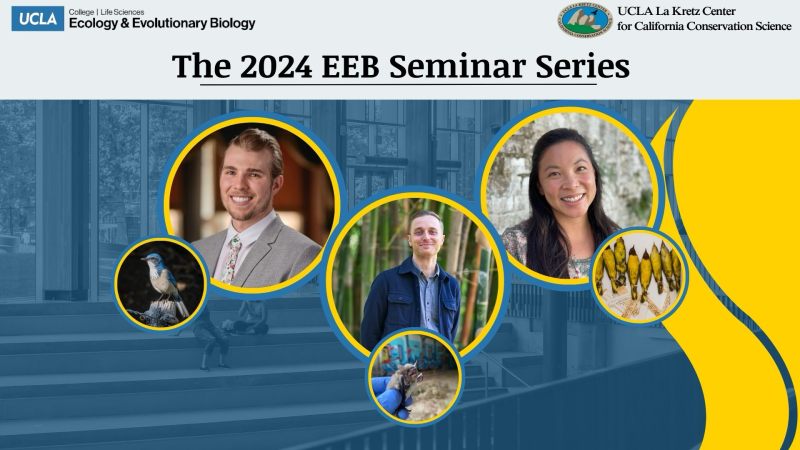
Join us during the EEB Seminar Series to hear from La Kretz Postdoctoral Candidates Joseph Curti, Devon DeRaad, and Whitney Nakashima! Each seminar is Co-hosted by the La Kretz Center and is open to all UCLA students and faculty. See details for each seminar listed below.
Wednesday, January 31st, 2024
Using Vertical Gradients of Urban Stressors to Characterize 3D Activity of Mobile Urban Species
Speaker: Joseph Curti (UCLA)
Zoom Link: https://ucla.zoom.us/j/94668130361.
Description: Urbanization is a major force shaping modern distributions of native species, and associated anthropogenic stressors (e.g, artificial light at night and noise) are increasing steadily every year. Research on the ecological impacts of these stressors is generally constrained to how they vary horizontally across the landscape, despite evidence that the vertical air column (the aerosphere) is critical habitat for a range of organisms and ecosystem processes. Bats are an excellent system to investigate three-dimensional responses to urban stressors because they are mobile flying animals that have varying sensitivity to light and sound disturbance, according to their traits. La Kretz Center Postdoctoral Fellow Candidate Joseph Curti’s proposed research will specifically ask 1) in what ways do bat functional groups respond to anthropogenic gradients in the vertical niche, 2) do noise and light stressors interact to influence vertical variability in bat activity and foraging behavior, and 3) are these results generalizable across multiple manifestations of urban centers in California. By studying the relationships of bat traits and variation in anthropogenic stressors in the novel context of vertical strata, he and his project mentors will be able to make recommendations for applied mitigation measures to resource managers and policymakers working in cities.
Project Mentors: Dr. Morgan Tingley (Ph.D.; EEB) & Kat Superfisky (LA City- Urban Ecologist)
Wednesday, February 7th, 2024
Scrub-Jays: an emerging model system for studying evolution and understanding conservation priorities in California
Speaker: Devon DeRaad (KU)
Zoom Link: https://ucla.zoom.us/j/94668130361.
Description: La Kretz Center Postdoctoral Fellow Candidate Devon DeRaad plans to use genomic approaches to characterize the genetic diversity and relatedness of scrub-jays throughout the state of California. This includes a conservation genomics assessment for the Island Scrub-Jay, the most range restricted U.S. endemic bird species, a state-wide landscape genomics approach for the California Scrub-Jay, and the first genomic sequencing of the California Scrub-Jay California endemic subspecies Aphelocoma californica cana. These projects will guide conservation priorities for scrub-jays and reveal broadly relevant evolutionary mechanisms and landscape features that have shaped biodiversity and conservation needs for taxa throughout the state of California.
Project Mentors: Dr. Stepfanie Aguillon (Ph.D.; EEB) & Dr. Katy Delaney (Ph.D.; NPS)
Wednesday, February 14th, 2024
Understanding the past to conserve the future: integrating historical museum collections and avian conservation genomics.
Speaker: Whitney Nakashima (UCLA)
Zoom Link: https://ucla.zoom.us/j/94668130361.
Description: Climate change is a major threat to biodiversity and is proceeding at an unprecedented rate. The US alone has estimated a loss of three billion birds since 1970. To protect species in the face of rapid environmental change, we need to base our conservation decisions on informed predictions of species response to changing climate regimes. By using modern and historical genomic, population, and climate data, La Kretz Center Postdoctoral Fellow Candidate Whitney Nakashima will investigate how three bird species in California have adapted to climate change in the past to protect them in the future. She will forecast species’ adaptive potential, identify where populations are most vulnerable to climate change, and locate climate refugia and connectivity corridors where species are likely to persist under future climate change scenarios. Working with her conservation partners at Audubon California and The Nature Conservancy, they will use these results to inform on-the-ground conservation actions to ensure their survival in a changing landscape.
Project Mentors: Dr. Felipe Zapata (Ph.D.; EEB) & Andrea Jones (Audubon CA)
